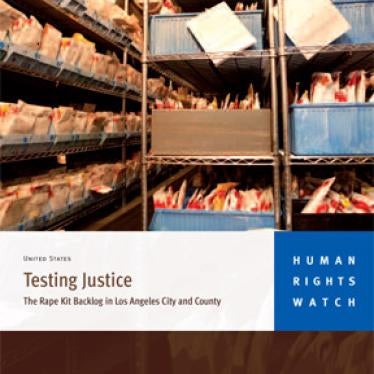As a researcher on the rape kit backlog in the US, I have interviewed many survivors of rape. Still, this experience did not prepare me for the story I heard in January from a disabled woman in North Dakota who was brutally raped by an acquaintance.
While this woman was recovering from surgery required to repair her internal organs after the rape she received a bill from her hospital for the cost of her rape kit, a forensic exam to collect DNA and other evidence from the body of the victim. She was eventually able to get her state's victim compensation board to pay the hospital, but in the meantime she kept receiving notices from the hospital's bill collector.
"I could not believe this was happening to me, after all this," she told me. "It got resolved, thank God, but not before I started to worry that my inability to come up with the money to pay the hospital would jeopardize my case. They tell me it wouldn't have, but it was so much worry that I didn't need."
Last week, a local TV station reported that some rape victims in Texas had been billed for the cost of their rape kit - which, depending on the state and the hospital, can reach $2,000. Last year, a newspaper reported that rape victims in North Carolina were asked to bill their insurance for the rape kit cost and, if they refused or did not have insurance, they were sent the bill. And then there was the election season story that Wasilla, Alaska (led by then-Mayor Sarah Palin) billed rape victims for their rape kit collection.
These examples have stirred up justifiable outrage. No crime victim should be asked to pay to collect evidence and it is even more horrifying that this would be asked of survivors of a heinous crime like sexual violence who have already demonstrated enormous courage and commitment to justice in submitting to the examination. A victim agrees to the collection of a rape kit in the hope that DNA testing will help police apprehend her (and sometimes his) assailant. Charging the victim to collect the evidence is so foreign to our sense of justice and basic compassion that it is comforting to believe it is limited to these few places.
Unfortunately, poorly drafted state laws and bureaucratic bungling mean that too many rape victims across the country are pressed to pay, or arrange payment for, the cost of their rape kits.
The federal Violence Against Women Act prohibits states from charging victims for rape kit collection, or risk losing federal funding, and every state has passed a law to implement this requirement. This is a significant and necessary reform, but its effect is limited by weak state laws and the way hospitals, the police, prosecutors, and victim compensation funds interpret and carry out their obligation to assume the cost of rape kit collection.
Some state laws are simply inadequate. For example, Oklahoma's law caps compensation for rape victims at $450. This covers barely one-third of the estimated cost of collecting a rape kit in that state. Maine's law caps compensation at $500.The laws in North Dakota, Oregon, and the District of Columbia allow the victim to seek compensation for any cost she incurs for the collection of her rape kit. This means that the victim may first have to pay the bill herself, and then apply for compensation. In Montana, the victim is supposed to be compensated as long as the victim compensation fund does not run out and as long as she cooperates with the investigation.
Other states, like Texas, have laws that appear adequate but can be poorly executed. Texas's statute seems clear: law enforcement must pay the cost of a rape kit. In practice, the payment process is far from simple. In February 2009, I spoke with a rape victim in Texas who received a notice from the hospital that the police had paid $700 toward the cost of the exam, leaving her responsible for the remaining $800. She didn't know about the victim compensation fund, and made two payments of $50 each before a victim's advocate helped her to apply to the fund, which eventually paid the remainder.
The woman told Human Rights Watch: "I don't understand why they had to involve me at all. Why couldn't [the victim compensation fund] and the police and the hospital have worked it out on their own? The payment of my rape kit seemed like a big hassle."
If rape kits are to be treated like fingerprints collected at a robbery - in fact like every other kind of forensic evidence - then states should assume the full cost, in every case, regardless of the circumstances. States also need to prohibit the parties responsible for payment, such as hospitals, from billing the rape victim or pressing her to pay the bill and seek compensation later.
Agreeing to the collection of a rape kit represents a victim's hope for justice in her case. Receiving a bill in the mail for basic police work represents an unacceptable but still too common truth - that the criminal justice system has a lot to learn about how it deals with rape victims.







